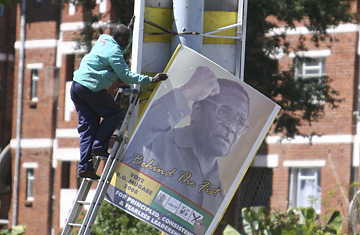
Council workers remove the campaign posters of President Robert Mugabe in Harare.
One of the few victories of South African President Thabo Mbeki's year-long backroom mediation between Robert Mugabe's regime and the opposition in Zimbabwe was an agreement that election results be posted outside polling stations. It was that concession to transparency by the ruling Zimbabwe African National Union-Patriotic Front (Zanu-PF) that prevented a centralized rigging of the March 29 general election, and allowed the opposition Movement for Democratic Change (M.D.C.) to unofficially claim victory in both the parliamentary and presidential elections. Now the fear is that those same lists will guide pro-Mugabe mobs on a campaign of violence and intimidation designed to ensure the Zimbabwean President retains power after all.
The Zimbabwe Election Commission eventually endorsed the M.D.C.'s claim of victory in parliament, giving it 109 seats to Zanu-PF's 97. The commission still hasn't announced the presidential result, but the M.D.C. has declared that its leader, Morgan Tsvangirai, won 50.3% of the vote—an outright victory that would make a run-off unnecessary. The idea that the Zanu-PF might secretly concur with that assessment gathered strength Sunday when, with the Election Commission still sitting on the official tally, the ruling party demanded a recount.
That request, the election commission's stalling and Zanu-PF's unhurried attitude towards resolving the crisis all seem to indicate Mugabe is playing for time. So, too, do reports quoting diplomats in Harare as saying that Mugabe may issue a presidential decree delaying a run-off between him and Tsvangirai for 90 days. More time would allow Mugabe to mobilize his shock troops—the so-called "veterans" who overran white-owned farms in the late 1990s and early years of this century.
The veterans are a loose rabble of violent protesters — some veterans of Zimbabwe's liberation struggle, some born after independence in 1980 — who aligned themselves with Mugabe in return for his support of their land seizures. On Saturday a few hundred of them paraded through downtown Harare, unmolested by riot police, and noisily demanded loyalty to Mugabe. That came after raids by the security services on a hotel room used as an office by M.D.C. and the arrest of two Western journalists accused of working without accreditation (something they are routinely refused) on Thursday night. M.D.C. secretary general Tendai Biti reacted by saying Mugabe had "declared war." At a press conference Saturday, Tsvangirai warned of a gathering "war against the people," adding, "In the run-off, violence will be the weapon." Tsvangirai flew to South Africa late on Sunday for talks to try to bolster international pressure on Mugabe.
The fear now is that the regime will encourage the veterans to deploy to opposition strongholds across the country. Just where those bastions are located is now all too obvious in the results posted on the sides of polling stations across Zimbabwe. "Our guys voted Zanu-PF, which was a disappointment," said the South Africa-based brother of one white farmer who has held onto his land in northern Zimbabwe. "But in hindsight, it's a blessing in disguise. The next-door farm voted M.D.C., and those guys are pretty worried now."
Zanu-PF's contempt for democracy, paired with a simultaneous need for a veneer of respectability, is symptomatic of Mugabe's leadership style: dictatorial but self-righteous. Johannesburg-based Heidi Holland is one of the few journalists to have met Mugabe more than once. In her book, Dinner With Mugabe, she tries to explain the mystery of Mugabe's mind. "Like the seemingly respectable married man who makes his living as a drug lord, Mugabe holds parallel positions," she writes. "The two are not coordinated in his divided self. While he was indeed the enlightened leader who wanted to develop the country, improve the plight of the poor and secure freedom by resisting colonial power, the once-admirable leader is also the person doing the terrible things that can't be mentioned He can insist that he never sacrifices his principles because the way he sees it, he did not set out to murder, and the torture people suffered was of their own doing. While he may not be mad in a clinical sense, his is a mad way of being in the world; a cut-off, deluded way."
So it is that the regime takes pains to appear as though it is acting legally and heroically (organizing elections, denouncing the M.D.C. for prematurely announcing their results, railing against bloody colonial imperialism) while at the same time keeping an iron grip on power (sanctioning vote-rigging, beating up Tsvangirai and others, as they did last year, and, in Matabeleland in the 1980s, committing mass murder). Hence its appeal to Zimbabwean patriots to vote for Mugabe and against Western imperialism, while all but ignoring the plight of a people enduring an economic collapse that is only hinted at by the numbers: more than 100,000% inflation and 80% unemployment. The most recent example of this duality came at the weekend, when the regime announced it would contest the results in 16 parliamentary seats won by the M.D.C. even as armed police blocked M.D.C. officials from filing a petition at the High Court demanding the election commission release the presidential election results. (The M.D.C. was able to deliver its petition Monday.)
The election campaign, in which the opposition was allowed to campaign more or less freely, suggested the regime was loosening its grip, or was at least divided and unable to repress. The days after March 29 saw further hopeful signs. The opposition declared victory, and Tsvangirai was even moved to declare the dawn of "a new Zimbabwe founded on restoration, not on retribution, equality not discrimination, love, not war, tolerance not hate." He even said, "After Saturday 29th of March, 2008, Zimbabwe will never be the same again." Unfortunately for Zimbabwe, Mugabe and the Zanu-PF seem merely to have been digesting their defeat and plotting their future. And they appear to have concluded that his future depends on Zimbabwe remaining exactly where it is.
